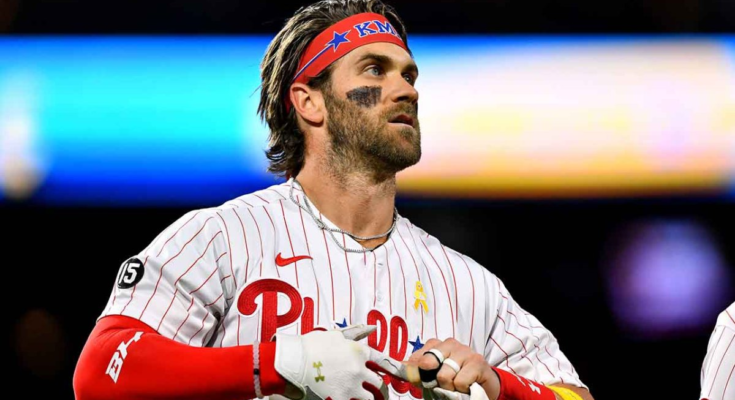It could have been so different.
Remember the night of April 28 at Busch Stadium in St. Louis?
Remember Bryce Harper being hit in the face by a 97-mph fastball?
Remember the fear that rippled through your body? Was his face shattered? Would he be blinded? Was his season over? His career? Worse?
Again, we’re talking about a rock-hard, 5.25-ounce leather sphere moving at a speed of 97 mph colliding with a man’s cheekbone.
It was difficult not to recall this scary moment Thursday night, difficult to resist juxtaposing the low point of Harper’s 2021 season with what is now the highlight.
Harper, the hair-flying, colorful-shoe-wearing, Phanatic-loving Phillies slugger, was named National League Most Valuable player, the announcement delivered by the greatest Phillie of them all, three-time NL MVP Mike Schmidt.
Two months earlier, Schmidt had penned an opinion piece for the Associated Press in which he endorsed Harper for the award. The Baseball Writers Association of America made it official. Harper received 17 of a possible 30 first-place votes to beat out two of the game’s brightest young stars, Fernando Tatis Jr. of the San Diego Padres and Juan Soto of the Washington Nationals.
Harper, who turned 29 in October, is the sixth Phillie to win the MVP, joining Hall of Famers Schmidt (1980, 1981, 1986) and Chuck Klein (1932), Whiz Kid Jim Konstanty (1950) and World Champions Ryan Howard (2006) and Jimmy Rollins (2007).
In addition, Harper becomes the 32nd player to win the award more than once. He also won it in 2015 while with the Washington Nationals. Barry Bonds leads the way with seven MVP awards.
Winning baseball’s most prestigious awards — Harper has collected several in recent weeks — represents some of the accomplishments that Phillies ownership envisioned when it signed him to a 13-year, $330-million contract in March 2019. The most coveted accomplishment, however, remains elusive. The Phillies have not reached the postseason in Harper’s three seasons with the club, never mind the ultimate goal — a World Series Championship.
Failing to reach the postseason for a 10th straight season in 2021 was hardly Harper’s fault.
A true MVP puts a team on his shoulders during pivotal, pressure-packed points in a season and keeps it in contention. Harper did that in 2021. He overcame multiple nagging injuries in the first half of the season — including ones caused by the head shot in St. Louis — and was close to a one-man show, at least offensively, while keeping the Phillies’ playoff hopes alive into the final week of the season.
Harper started 73 of the team’s 74 games after the All-Star break, including 72 in a row, and hit .338 with 28 doubles, 20 homers, 50 RBIs, a .476 on-base percentage and a .713 slugging percentage. His 1.188 OPS and 49 extra-base hits after the All-Star break led the majors.
For the season, he hit .309 with 35 homers, 84 RBIs, a .429 on-base percentage and a majors-best .615 slugging percentage. He led the majors in OPS (1.044) and slugging and his 78 extra-base hits were most in the NL.
Harper and Toronto’s Vladimir Guerrero Jr. were the only two players in the majors to slash at least .300/.400/.600. In addition, Harper became just the fourth player in history to reach at least 100 runs, 100 walks, 40 doubles and 35 homers in a single season, joining all-time greats Bonds, Babe Ruth and Stan Musial.
Earlier this offseason, Harper was named as the NL’s Outstanding Player by his peers (Players’ Choice Award). He won the Hank Aaron Award as the NL’s top offensive player, a Silver Slugger and the Stan Musial Award, which is given by the St. Louis Sports Commission and the National Sportsmanship Foundation. The Musial Award honors the year’s “greatest moments of sportsmanship and the biggest names in sports who embody class and character.”
The seeds for Harper’s winning of the Musial Award were planted on that harrowing April night in St. Louis when he was hit in the face by that 97-mph fastball thrown by a young pitcher named Genesis Cabrera. The situation could have become incendiary if Harper hadn’t reached out to St. Louis manager Mike Shildt the next day and offered calming words and support for Cabrera, who had been shaken by the incident.
No one, however, was more shaken than Harper.
“I was very fortunate to be able to call my wife and tell her I was OK,” he said a few days later. “And my family. Just very fortunate to be here. My mom said, ‘You must have had angels with you.’
“Just the replaying in my mind of the situation, thinking that a couple inches up, or a couple inches over to either side and we might be having a different conversation.”


